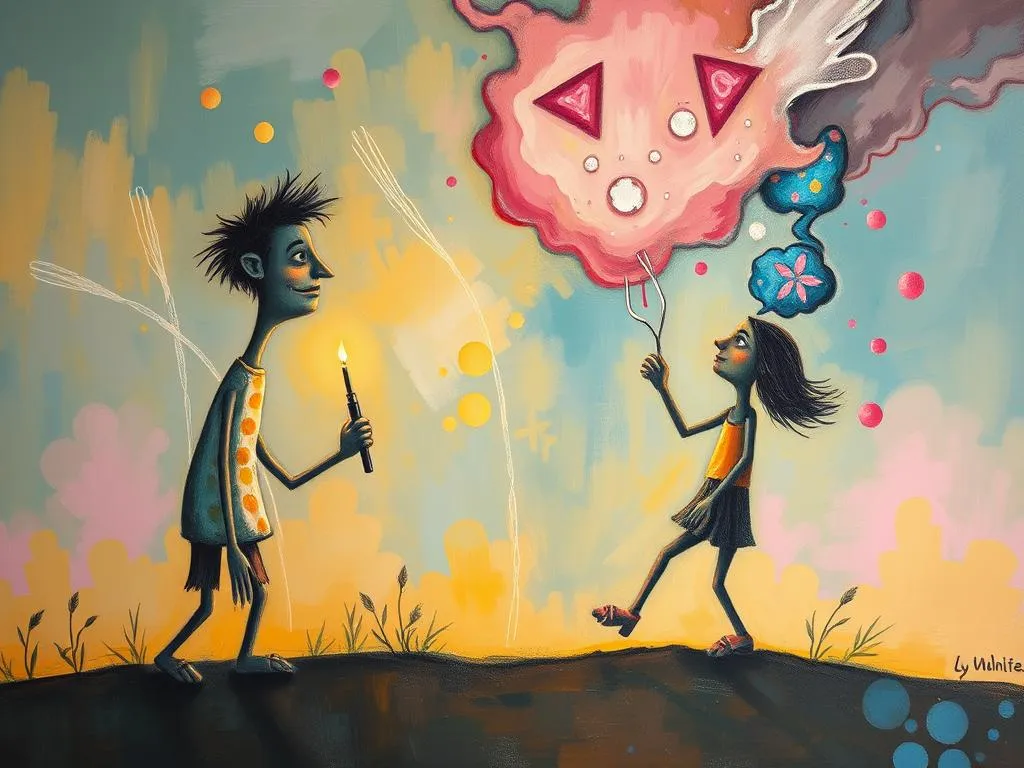
Have you ever jolted awake from a nightmare, heart racing, with vivid images of chaos and violence playing in your mind? It’s a horrifying scenario, one that can leave you questioning not only the meaning behind it but also your own psyche. While dreams about someone killing people can seem alarming, they often carry deeper meanings that can be explored and understood. Rather than dismissing them as mere figments of your imagination, consider them as invitations to explore your emotions, fears, and desires.
In this article, we’ll delve into the symbolic significance of such distressing dreams, analyze different scenarios that could manifest in these nightmares, and discuss how you can use these experiences for personal growth. Let’s embark on this journey of understanding together, like a supportive friend guiding you through the labyrinth of your subconscious.
Shadows of the Mind: Unpacking the Symbolism
When you dream of someone killing people, it’s crucial to recognize that these images are not necessarily about literal violence or a desire for harm. Instead, they often symbolize repressed emotions, conflict, or transformation within your life. The act of killing can represent a need to let go of certain aspects of yourself or situations that no longer serve you.
The Role of the Aggressor
The figure committing the violence in your dream can be especially telling. It might represent a part of yourself that feels angry, frustrated, or even empowered. Alternatively, this figure could symbolize someone in your life who embodies these traits, suggesting that their influence might be affecting your emotional state. Recognizing who this person is can be key to unraveling your feelings about them and your own inner turmoil.
Cultural Perspectives
Different cultures interpret dreams about violence in varied ways. In some Western traditions, such dreams may signify upcoming change or personal growth. In contrast, certain Indigenous cultures might view them as a warning sign, indicating that one must confront their fears or unresolved issues. Understanding these cultural narratives can provide additional layers of meaning to your experience, offering you a broader perspective on your feelings and the situations that may be lurking in your subconscious.
Psychological Insights
From a psychological standpoint, dreams of violence often reflect internal conflict. Sigmund Freud, the father of dream analysis, suggested that dreams are outlets for our unconscious desires and anxieties. In this context, a dream where someone is killed can signify a struggle with your own darker impulses or a desire to rid yourself of negative influences. Carl Jung, on the other hand, emphasized the importance of integration—suggesting that such dreams invite us to confront and embrace the shadows within ourselves to attain greater wholeness.
Nightmare Scenarios: Stories from the Dark
To better understand the nuances of these dreams, let’s explore a few hypothetical scenarios. Each represents a different emotional struggle or life situation, helping you relate and reflect on your own experiences.
1. The Betrayed Friend
Imagine dreaming about a close friend who suddenly turns violent, killing others in a rampage. This could symbolize feelings of betrayal or fear of losing trust. You might feel that someone close to you has turned against you, or it could represent your inner conflict about trusting others. Reflecting on your relationship with this friend may reveal hidden insecurities or unresolved issues.
2. The Power Struggle
Picture a dream where a colleague at work is violently attacking others, representing a chaotic office environment. This scenario might reflect your own feelings of being overwhelmed or powerless in your job. You might be grappling with workplace politics, feeling like you have to fight to assert your position. This dream could be a nudge to reevaluate your professional life and make necessary changes.
3. The Past Haunts
Consider a dream where you witness a loved one committing murder. This can be a manifestation of your guilt or shame regarding past actions or decisions. It may suggest that you haven’t fully processed these emotions, and they continue to haunt you. Acknowledging these feelings can be the first step toward healing.
4. The Fear of Losing Control
Now, envision a dream where you yourself are the one committing the violence. This alarming scenario may indicate feelings of anger or frustration that you have yet to express. You might feel like you’re losing control over a situation in your life, and this manifests as aggression in your dream. Recognizing these feelings can empower you to take constructive action in your waking life.
5. The Cycle of Violence
Finally, picture a dream where you witness a senseless act of killing in a public space. This might reflect the overwhelming nature of the violence and chaos in society today. It can symbolize your own anxieties about the world and your role in it. You may feel a sense of helplessness or urgency to create change, leading you to consider what you can do to mitigate your fears and contribute positively to your community.
Emerging from the Shadows: Your Path to Growth
While dreams of violence can be distressing, they also offer profound opportunities for self-discovery and healing. Here are some practical insights to help you navigate these experiences and use them for personal growth:
Embrace Your Emotions
Rather than shying away from the feelings these dreams evoke, embrace them. Journaling about your dreams and your emotions can provide clarity and help you process complex feelings. Write about what the dream made you feel and what aspects of your life might be related to those emotions. By confronting your feelings, you can begin to understand the root causes of your nightmares.
Seek Understanding and Context
Consider the context of your life when interpreting these dreams. Are you experiencing significant stress, change, or conflict? Connecting the dots between your waking life and your dreams can illuminate the source of your fears. This understanding can empower you to address the issues head-on rather than allowing them to manifest in your dreams.
Practice Mindfulness
Engaging in mindfulness practices—like meditation or deep breathing—can help you manage anxiety associated with these dreams. Mindfulness encourages you to remain present and aware of your emotions without judgment. This can create a safe space for you to explore the feelings that arise from your dreams, making them less frightening.
Seek Support
Sometimes, discussing your dreams with a trusted friend or therapist can provide new perspectives. They may help you uncover insights you hadn’t considered and offer support as you process your feelings. Remember, sharing your experiences can be a powerful step toward understanding and healing.
Transform Fear into Action
Finally, consider how the intensity of your dream can be redirected into positive action. If you feel anger or frustration, channel that energy into something constructive—be it activism, creative expression, or physical exercise. Transforming negative emotions into positive actions can help you regain a sense of control in your life.
As you reflect on your dreams and the emotions they evoke, remember that they are windows into your subconscious, revealing hidden truths and guiding you toward personal growth. Each dream is an opportunity to explore the complexities of your inner world, allowing you to confront fears, unresolved emotions, and desires that may otherwise remain buried.
In the end, the most powerful reflection is this: Your dreams, no matter how chaotic or violent, are not a reflection of your character—they are a mirror to your soul’s journey. Embrace them, learn from them, and let them guide you toward a more profound understanding of yourself.







